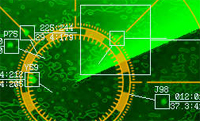GPS Surveillance Meets the Fourth Amendment: 2010 Online Law Trend
The parking lot next to my daughter’s daycare warns, “You are under constant video surveillance.” I don’t think they mean that in the universal sense, but the increasing use of mobile devices, smart cards, and databases draws the reality of constant surveillance closer.
As technologies start to share information, location privacy has the potential to become a thematic concern.
Location Tracking Can Be Both Really Useful and Really Creepy
 Fee-based services make it easy to turn a conventional cell phone into a tracking device. Simply install software, and you can monitor and record your child’s or employees’ every move, and even their speed. In an effort to improve school attendance, some judges are ordering truants to carry GPS trackers, and there’s a service to track and assist Alzheimers patients. Apparently, some people even want a GPS in their skivvies.
Fee-based services make it easy to turn a conventional cell phone into a tracking device. Simply install software, and you can monitor and record your child’s or employees’ every move, and even their speed. In an effort to improve school attendance, some judges are ordering truants to carry GPS trackers, and there’s a service to track and assist Alzheimers patients. Apparently, some people even want a GPS in their skivvies.
Being able to find people fast would be a boon to law enforcement. Police in Ohio used GPS to find the thief who robbed someone’s cash and GPS-equipped cell phone. Churches are using a free GPS service to protect nativity scenes from pilfering. (This also means there’s now a way to keep track of those wayward garden gnomes without waiting for postcards.)
Last year we wrote about a law that requires your car’s tires to report what they’re up to. And the Wild West nature of location tracking just keep increasing.
A GPS Beacon in Every Pocket
The government-mandated addition of GPS tracking to cellphones, and their increasing ubiquity, introduces the prospect of after-the-fact and real-time tracking of a person’s every move. (Remember the old Camelot song “I Wonder What the King is Doing Tonight”? Perhaps we should selectively apply this kind of tracking to elected representatives. I’m just sayin’.)
Massachusetts currently uses GPS cell phones to track snowplows. Insurance companies have proposed providing variable billing for the actual number of miles a vehicle travels. Same with vehicle taxation. Of course, such monitoring could also allow insurance firms to raise rates of vehicles that speed, or authorities to issue citations based on such speed data.
There are many ways to record location: IP address, smart card use, surveillance cameras. Then there’s my favorite, the video-equipped parking department vehicles that record where every car parked on the street spends the night. Even my city has a good idea of who is where each night.
Early Steps Towards Government Mass Surveillance by GPS
 Blogger Christopher Soghoian raised eyebrows with a recording of a Sprint executive at a conference exploring how Sprint provided a portal to give user GPS data to law enforcement agents “8 million times” over a 13-month span.
Blogger Christopher Soghoian raised eyebrows with a recording of a Sprint executive at a conference exploring how Sprint provided a portal to give user GPS data to law enforcement agents “8 million times” over a 13-month span.
While serving as a U.S. attorney during the Bush administration, Christopher Christie tracked the whereabouts of citizens through their cell phones without warrants. The ACLU obtained documents detailing the spying program from the Justice Department in an ongoing lawsuit over cell phone tracking.
Does State Tracking of Innocent Citizens Constitute a Search?
The Fourth Amendment protects citizens from unreasonable search, but it doesn’t specifically address surveillance. In general, by entering the public sphere, we assent to be observed. But does constant surveillance constitute intrusion?
The operative ruling in this space, United States v. Knotts in 1983, established that court supervision is not required for police to plant radio tracking devices focused primarily on activity in public spaces.
To my knowledge, no court has considered whether Fourth Amendment protection exists for people who willingly carry a GPS-enabled device, but in light of Knotts, the chance of such a ruling seems remote. Yet the Knotts ruling suggests that reconsideration may be necessary as technology make “mass tracking” available to the state.
Databases, ubiquitous GPS, and internet tracking make a range of personal activities available for compilation in government records. Without specific prohibitions, Big Brother will watch. And government leaders will act less like public servants, and more like contestants playing the game Civilization … where their actions can be easily measured through data showing public response.

 The future of digital experiences will be built by strategists who grasp the full array of emerging business, social, and technical models. Specialties in user experience, branding, application design, and data science are laying the foundation for richer user experiences and business models breakthrough products and revenue based marketing.
The future of digital experiences will be built by strategists who grasp the full array of emerging business, social, and technical models. Specialties in user experience, branding, application design, and data science are laying the foundation for richer user experiences and business models breakthrough products and revenue based marketing.
2 Responses to "GPS Surveillance Meets the Fourth Amendment: 2010 Online Law Trend"
February 18, 2010
[…] GPS Surveillance Meets the Fourth Amendment […]
May 21, 2010
Your point is very positive.
I like your style so much, I am your honest reader.